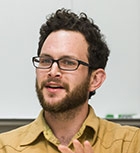Student Profiles
Matthew Zussman

Life beyond Reed
Most summers, Matt leaves suddenly sunny Portland for the Sierra Nevada Mountains, where he lives and works as a backcountry ranger for Sequoia and Kings Canyon National Park. The rest of the year, he bikes in the rain to work on hardwood flooring, painting, and other construction jobs. Matt graduated in May 2015. His thesis placed Planet of the Apes within the discourse of post-apocalypse, Eden, wasteland, and wilderness movements.
Academic interests
Matt most often studies literature, film, and intellectual/cultural history. His MALS courses have culminated in projects on Jonathan Swift, David Lynch, Flannery O’Connor, religiosity in early Cold War American music, and a critical analysis of college drag balls. He has presented papers at two conferences in Los Angeles with support from the MALS program: one on a turn of the 20th-century evangelical healer’s clash with the professionalizing medical establishment, and an ongoing project that reads Orson Welles’s adaptation of Kafka’s The Trial as a Holocaust film.
Why MALS?
“I knew that I wanted further, intensive academic study, but I didn’t want to confine myself narrowly. I wanted to continue studying the history and religion that had been my focuses as an undergraduate at Colorado College, but I also wanted to test some of the other intellectual passions that I’d been developing on my own. I plan eventually to pursue a doctorate; in part, the MALS program has helped me decide whether that will be in history, literature, American studies, religion, or something else. MALS allowed me to engage in a wide range of rigorous interdisciplinary study, while I financed the life of the mind by honing skills in manual trades and working in the wilderness in between studies. And it all somehow related; an intellectual history course on "Technology and Social Thought," for instance, continues to provide quite germane food for thought while sanding hardwood floors, climbing mountains, and critically understanding the ways that Park visitors interact with wilderness management policy.”